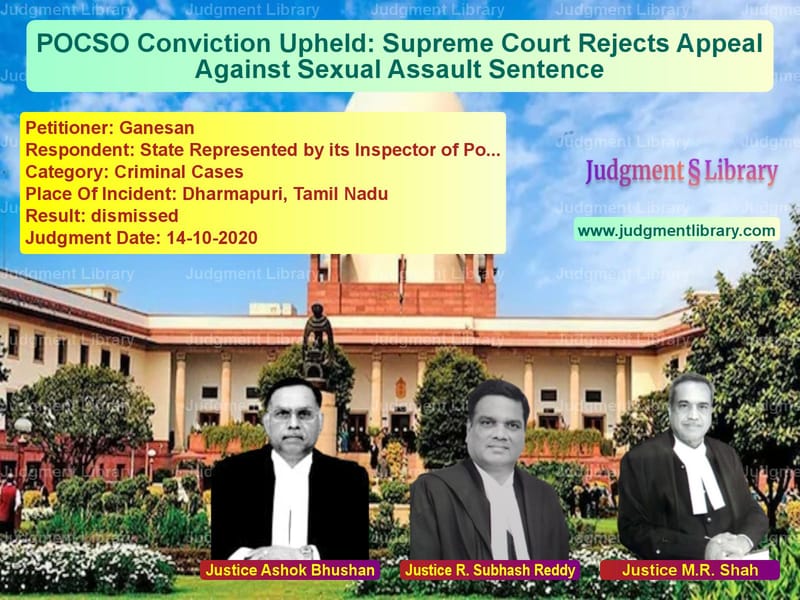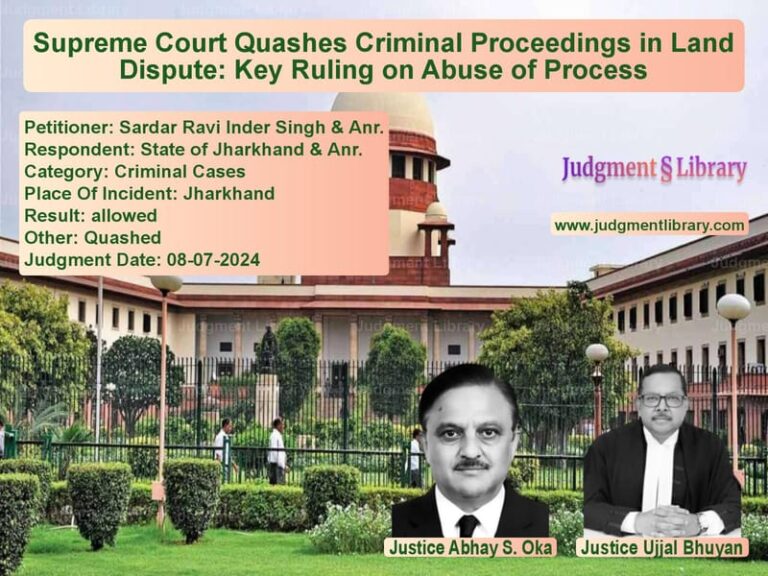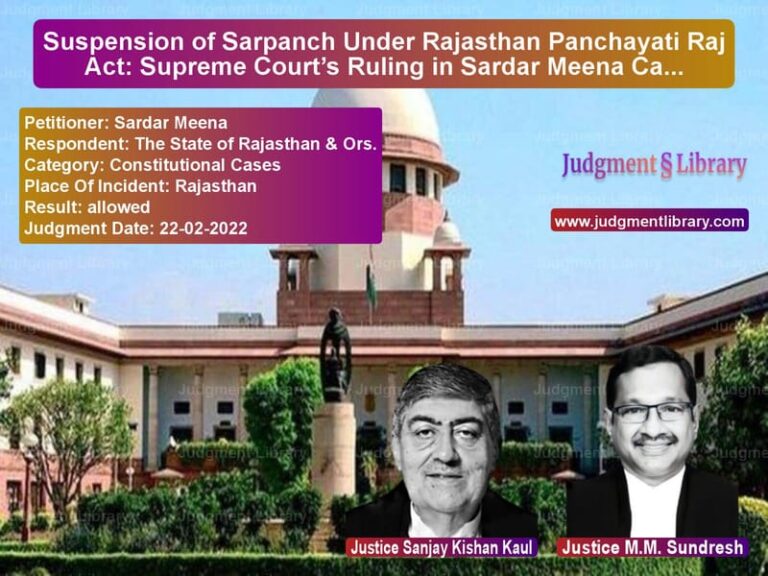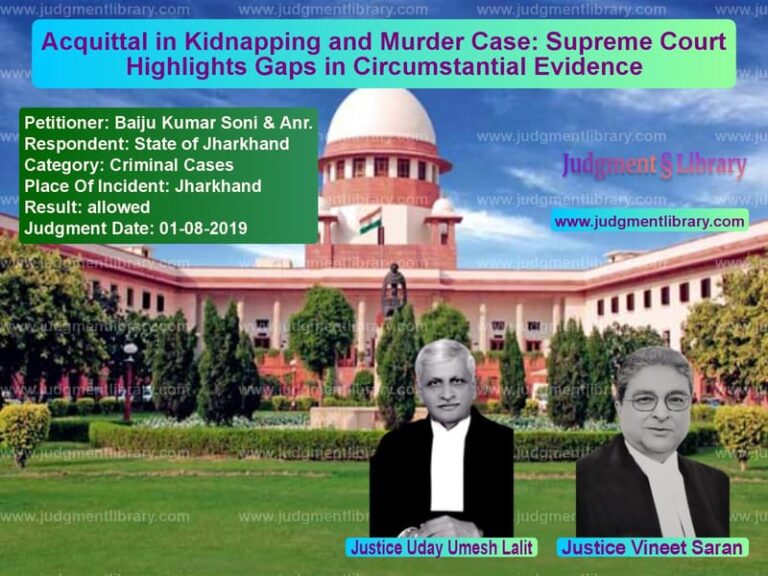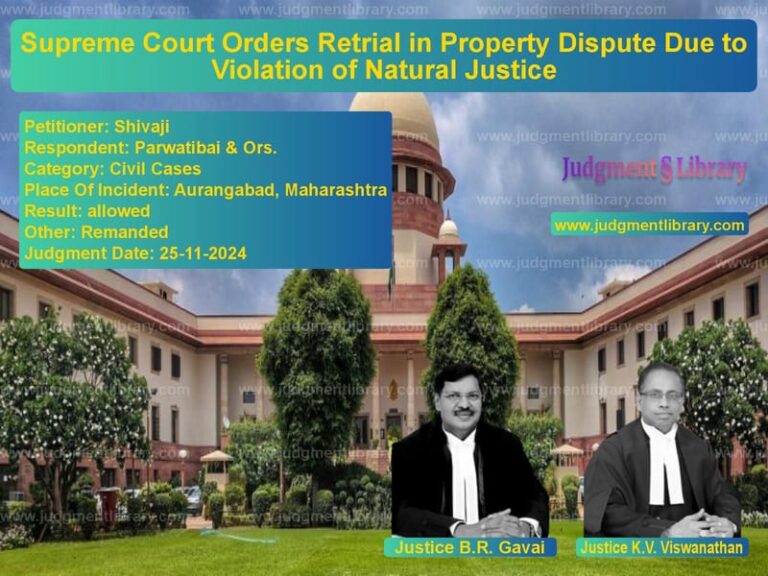POCSO Conviction Upheld: Supreme Court Rejects Appeal Against Sexual Assault Sentence
The case of Ganesan vs. State Represented by its Inspector of Police revolves around the conviction of the appellant under the Protection of Children from Sexual Offences (POCSO) Act, 2012. The Supreme Court was tasked with determining whether the High Court had denied the accused a fair hearing and whether the conviction was justified based on the evidence presented.
Background of the Case
The appellant, Ganesan, was tried and convicted by the Fast Track Mahila Court, Dharmapuri, for an offense under Section 7 read with Section 8 of the POCSO Act. The trial court relied primarily on the deposition of the victim (PW3), who was 13 years old at the time of the incident. Based on her testimony, the trial court sentenced the accused to three years of rigorous imprisonment, which is the minimum sentence prescribed under Section 8 of the POCSO Act. Additionally, the court ordered him to pay a compensation of Rs. 1 lakh to the victim under Rule 7(2) of the POCSO Rules, 2012.
Appeal to the High Court
The accused challenged his conviction before the Madras High Court. The appeal was taken up for hearing on 24.04.2019, but his lawyer was absent. The High Court removed the advocate’s name and appointed a Legal Aid Counsel. The appeal was then listed for further hearing on 29.04.2019. On that date, the Legal Aid Counsel made submissions only regarding the compensation and did not argue the case on merits. Consequently, the High Court modified the compensation order, directing the State to pay the amount and recover it from the accused if he had sufficient means. However, the High Court dismissed the appeal on conviction and sentence.
Arguments of the Parties
Appellant’s (Ganesan’s) Arguments
- He was denied a fair opportunity to present his case as the High Court disposed of the appeal within four days after appointing Legal Aid Counsel.
- The victim’s mother (PW2) had turned hostile, which cast doubt on the prosecution’s case.
- There were lapses in the prosecution’s evidence, and the benefit of doubt should have been granted to the accused.
- The trial court failed to consider the existence of previous enmity between the parties.
Respondent’s (State’s) Arguments
- The victim’s (PW3) testimony was clear, trustworthy, and sufficient to convict the accused.
- The trial court had already shown leniency by imposing only the minimum sentence prescribed under the POCSO Act.
- A conviction can be based solely on the testimony of the victim if it is reliable.
- The High Court had given the accused an opportunity for a fair hearing, and his Legal Aid Counsel had chosen to focus only on the compensation aspect.
Supreme Court’s Analysis and Judgment
1. Fair Opportunity to the Accused
The Supreme Court acknowledged the appellant’s argument that the High Court disposed of the appeal within four days of appointing Legal Aid Counsel. However, it found no evidence that the Legal Aid Counsel was unprepared or that the accused was denied justice. The Court stated:
“The Legal Aid Counsel was provided, and there is nothing on record to suggest that he did not have access to case documents or was unable to argue effectively.”
2. Reliability of Victim’s Testimony
The Supreme Court emphasized that the testimony of a victim, especially in POCSO cases, is sufficient to convict the accused if it is reliable and unblemished. The Court cited past judgments that held:
“A conviction can be recorded on the sole testimony of the prosecutrix if her evidence is credible and of sterling quality.”
The Court found the victim’s testimony to be clear and trustworthy, rejecting the argument that her mother turning hostile weakened the case.
3. Existence of Previous Enmity
The appellant argued that there was previous enmity between the parties, which should have been considered. However, the Court held that:
“Mere previous enmity does not automatically discredit the testimony of the victim, especially when it is found to be reliable and consistent.”
4. Minimum Sentence Under the POCSO Act
The Supreme Court noted that the trial court had imposed only the minimum sentence of three years of rigorous imprisonment. Given the seriousness of the offense and the objectives of the POCSO Act, there was no justification for further leniency.
Final Verdict
The Supreme Court dismissed the appeal, upholding the conviction and sentence. However, it confirmed the High Court’s modification regarding compensation, ensuring that the State would pay the victim and recover it from the accused if he had the financial means.
Key Takeaways
- The victim’s testimony in a POCSO case is sufficient for conviction if it is credible and consistent.
- Merely turning hostile does not discredit other witnesses’ testimony.
- A fair opportunity to be heard does not mean indefinite delays; Legal Aid Counsel was provided and argued the case.
- The minimum sentence prescribed under the POCSO Act must be imposed unless there are exceptional circumstances.
- The State may compensate victims of sexual offenses and recover the amount from the accused if feasible.
This ruling reinforces the importance of protecting child victims and ensuring swift justice in cases under the POCSO Act.
Petitioner Name: Ganesan.Respondent Name: State Represented by its Inspector of Police.Judgment By: Justice Ashok Bhushan, Justice R. Subhash Reddy, Justice M.R. Shah.Place Of Incident: Dharmapuri, Tamil Nadu.Judgment Date: 14-10-2020.
Don’t miss out on the full details! Download the complete judgment in PDF format below and gain valuable insights instantly!
Download Judgment: Ganesan vs State Represented by Supreme Court of India Judgment Dated 14-10-2020.pdf
Direct Downlaod Judgment: Direct downlaod this Judgment
See all petitions in Bail and Anticipatory Bail
See all petitions in Judgment by Ashok Bhushan
See all petitions in Judgment by R. Subhash Reddy
See all petitions in Judgment by Mukeshkumar Rasikbhai Shah
See all petitions in dismissed
See all petitions in supreme court of India judgments October 2020
See all petitions in 2020 judgments
See all posts in Criminal Cases Category
See all allowed petitions in Criminal Cases Category
See all Dismissed petitions in Criminal Cases Category
See all partially allowed petitions in Criminal Cases Category

